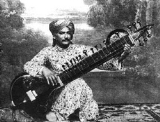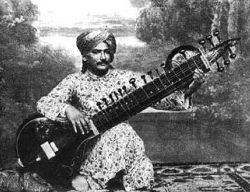
Enayat Khan
Encyclopedia

India
India , officially the Republic of India , is a country in South Asia. It is the seventh-largest country by geographical area, the second-most populous country with over 1.2 billion people, and the most populous democracy in the world...
's most influential sitar
Sitar
The 'Tablaman' is a plucked stringed instrument predominantly used in Hindustani classical music, where it has been ubiquitous since the Middle Ages...
and surbahar
Surbahar
Surbahar , sometimes known as bass sitar, is a plucked string instrument used in the Hindustani classical music of North India. It is closely related to sitar, but it has a lower tone. Depending on the instrument's size, it is usually pitched two to five whole steps below the standard sitar, but...
players in the first decades of the 20th Century. He was the father of Vilayat Khan
Vilayat Khan
Ustad Vilayat Khan was one of India's well known sitar maestros, born in Gauripur in Mymensingh, Bengal...
, one of the topmost sitariyas of the postwar period.
Enayat Khan was born in Uttar Pradesh
Uttar Pradesh
Uttar Pradesh abbreviation U.P. , is a state located in the northern part of India. With a population of over 200 million people, it is India's most populous state, as well as the world's most populous sub-national entity...
into a family of musicians. His father was sitar great Imdad Khan
Imdad Khan
Ustad Imdad Khan was a sitar and surbahar player. His two sons Enayat Khan and Wahid Khan, his grandsons Vilayat Khan and Imrat Khan, and great-grandsons Shahid Parvez, Shujaat Khan, Nishat Khan, Irshad Khan, Wajahat Khan, Shafaatullah Khan and Hidayat Khan have all upheld his musical tradition,...
, who taught him the sitar and surbahar (bass sitar) in the family style, known as the Imdadkhani Gharana
Imdadkhani gharana
The Imdadkhani gharana is a North Indian school of sitar and surbahar music, stemming from the very ancient Gwalior gharana. It was created by Imdad Khan , and is also known as the Etawah gharana, after a village outside Agra where Imdad lived...
or Etawah Gharana (school), after a village outside Agra
Agra
Agra a.k.a. Akbarabad is a city on the banks of the river Yamuna in the northern state of Uttar Pradesh, India, west of state capital, Lucknow and south from national capital New Delhi. With a population of 1,686,976 , it is one of the most populous cities in Uttar Pradesh and the 19th most...
where Imdad once lived. He married Basiran Bibi, daughter of khyal
Khyal
Khyal is the modern genre of classical singing in North India. Its name comes from an Arabic word meaning "imagination". It is thought to have developed out of the qawwali singing style. It appeared more recently than dhrupad, is a more free and flexible form, and it provides greater scope for...
singer Bande Hussain, and settled with his family in Calcutta, where, though he only lived to 43, he did much pioneering work on the sitar. For example, he standardised its physical dimensions and added the upper resonator gourd, which is very popular with today's players (though his own descendants have not kept using it). In a place rapidly developing into an important North Indian centre of the arts, at a time where interest in national culture was strong fuelled by the struggle for independence, he brought sitar music out from its narrow connoisseur circles to new mass audiences. Nobel
Nobel Prize
The Nobel Prizes are annual international awards bestowed by Scandinavian committees in recognition of cultural and scientific advances. The will of the Swedish chemist Alfred Nobel, the inventor of dynamite, established the prizes in 1895...
laureate Rabindranath Tagore
Rabindranath Tagore
Rabindranath Tagore , sobriquet Gurudev, was a Bengali polymath who reshaped his region's literature and music. Author of Gitanjali and its "profoundly sensitive, fresh and beautiful verse", he became the first non-European Nobel laureate by earning the 1913 Prize in Literature...
was a musical collaborator and personal friend. Some of Enayat Khan's recordings have been released on CD, on the Great Gharanas: Imdadkhani compilation in RPG/EMI
EMI
The EMI Group, also known as EMI Music or simply EMI, is a multinational music company headquartered in London, United Kingdom. It is the fourth-largest business group and family of record labels in the recording industry and one of the "big four" record companies. EMI Group also has a major...
's Chairman's Choice series.
Enayat died young, with four children. His two sons, Vilayat
Vilayat Khan
Ustad Vilayat Khan was one of India's well known sitar maestros, born in Gauripur in Mymensingh, Bengal...
and Imrat
Imrat Khan
Imrat Khan is a leading sitar and surbahar player. He is the younger brother of sitar maestro Ustad Vilayat Khan.-Training and early career:...
, were trained in the Imdadkhani style by other members of his extended family. Vilayat learned the sitar and Imrat the surbahar; both were to become very famous classical musicians.
Footnote
Before conversion, the family had been of RajputRajput
A Rajput is a member of one of the patrilineal clans of western, central, northern India and in some parts of Pakistan. Rajputs are descendants of one of the major ruling warrior classes in the Indian subcontinent, particularly North India...
lineage, and in an informal continuation of that tradition, Enayat Khan also had the Hindu
Hindu
Hindu refers to an identity associated with the philosophical, religious and cultural systems that are indigenous to the Indian subcontinent. As used in the Constitution of India, the word "Hindu" is also attributed to all persons professing any Indian religion...
name of Nath Singh. (Deepak Raja, booklet for Ulhas Kashalkar
Ulhas Kashalkar
Pandit Ulhas N Kashalkar is a noted Hindustani classical vocalist. He has received training in the Gwalior, Jaipur and Agra gharanas, and is considered a legitimate representative of all three schools.-Early life:...
's Tribute to Vilayat Khan CD (India Archive Music IAMCD 1071, 2003), page 21.)

